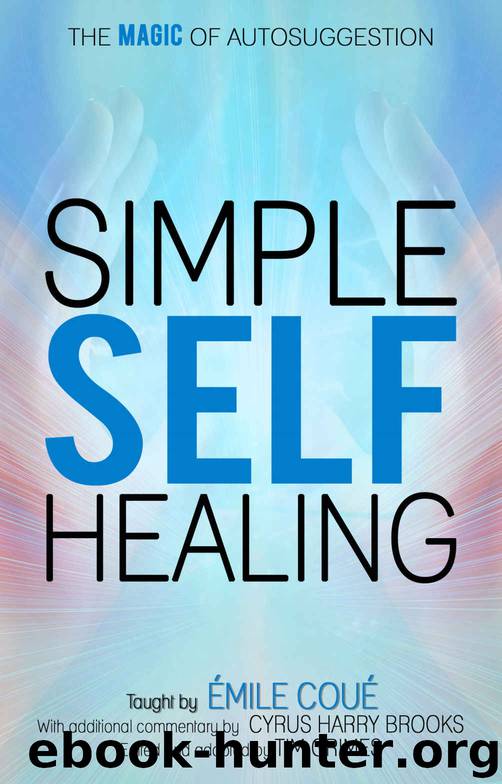Simple Self-Healing: The Magic of Autosuggestion by Coue Emile

Author:Coue, Emile [Coue, Emile]
Language: eng
Format: epub
Published: 2017-04-12T16:00:00+00:00
EDUCATION OF CHILDREN
Paradoxical as it may appear to those who haven’t fully understood the principles and workings of autosuggestion, the education of a child begins even before it’s born!
Without going back to explanations which I have given, I need only say that the imagination plays the supreme role in every function of life, and that by disciplining it – in other words, by exercising autosuggestion – a prospective mother can not only determine the sex of her child (this has been demonstrated by certain medical authorities) but also, to a large degree, its physical and moral characteristics. She has only to let her imagination deposit in her subconscious mind the image of the son or daughter she desires and the qualities she wishes the unborn infant to possess. The result is assured.
Even more important, perhaps, is the fact that such a child will yield more readily than most to suggestion. Which doesn’t mean that its character is likely to be weak. On the contrary, the probabilities are that it will – as it grows up – exchange suggestion for autosuggestion, and achieve perfect self-mastery. Only it must be remembered that our acts and deeds are, for the most part, the result of past outside suggestions or example.
The importance of beginning a child’s education early, and of controlling the suggestions destined to influence and mold the young mind, must therefore be obvious. Parents and educators must be careful to implant in it only good suggestions and protect it at all costs from bad ones.
How’s that done? I’ll try to give a few recommendations. They must, of course, be taken as general ones, and may be modified or adapted to individual subjects and circumstances. Treat children with an equitable temper, speaking in tones gentle but firm, persuading them to obey without giving them the temptation to resist your influence. Never be rough with a child, for to do so is to risk provoking a sentiment of fear accompanied by sullenness or even hate. Avoid talking ill of people in the presence of children; they’ll inevitably follow your example later on. And backbiting often leads to disaster.
Seek to awaken in children’s minds the desire to understand nature. Keep them interested. Answer their questions clearly, with good-humor. Don’t put them off – as so many of us are tempted to do – with such replies as, “Oh, you’re bothering me,” or “You’ll know all about that later.” Above all, never on any account tell a child that he or she is a “storyteller,” or lazy, or a dunce, or worse. Remember that such suggestions have a very strong tendency to become realities, just as the better kinds of suggestions have.
Encouragement is particularly necessary to children. Say to a child inclined to be lazy or negligent, “Well, you’ve done much better than usual today. I’m very pleased with your work, you’re improving.” It may not be true. No matter. The idea of improvement – of excellence, of endeavor – will sink into the child’s mind and gradually, with judicious encouragement, be transformed unconsciously into fact.
Download
This site does not store any files on its server. We only index and link to content provided by other sites. Please contact the content providers to delete copyright contents if any and email us, we'll remove relevant links or contents immediately.
| Acupuncture & Acupressure | Aromatherapy |
| Ayurveda | Chelation |
| Chinese Medicine | Energy Healing |
| Healing | Herbal Remedies |
| Holistic | Homeopathy |
| Hypnotherapy | Massage |
| Meditation | Naturopathy |
| Reference |
Inner Engineering: A Yogi's Guide to Joy by Sadhguru(5905)
The Power of Now: A Guide to Spiritual Enlightenment by Eckhart Tolle(4764)
Fear by Osho(4091)
The Art of Happiness by The Dalai Lama(3389)
The Ultimate Bodybuilding Cookbook by Kendall Lou Schmidt(3320)
Yoga Therapy by Mark Stephens(3224)
Ikigai by Héctor García & Francesc Miralles(3151)
The Little Book of Hygge by Meik Wiking(3086)
Why Buddhism is True by Robert Wright(2830)
The Healing Self by Deepak Chopra(2799)
Being Aware of Being Aware by Rupert Spira(2710)
Shift into Freedom by Loch Kelly(2695)
Wild Words from Wild Women by Stephens Autumn(2598)
Work Clean by Dan Charnas(2563)
Happiness by Matthieu Ricard(2526)
The Hatha Yoga Pradipika (Translated) by Svatmarama(2495)
Yoga Body & Mind Handbook by Jasmine Tarkeshi(2465)
More Language of Letting Go: 366 New Daily Meditations by Melody Beattie(2454)
Why I Am Not a Feminist by Jessa Crispin(2244)
